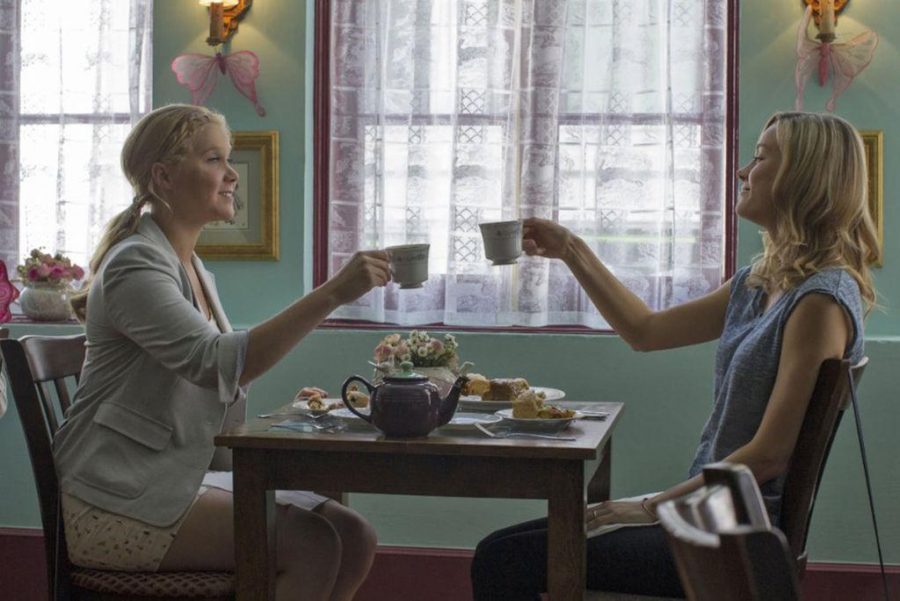“Trainwreck”
Starring: Amy Schumer, Bill Hader, Tilda Swinton
Directed by: Judd Apatow
Grade: B+
Amy Schumer’s new romantic comedy “Trainwreck” is anything but.
Posters for the rom-com, written by Amy Schumer, who also stars in the film, call director Judd Apatow as “the guy who brought you ‘Bridesmaids.’” But that’s where the similarities between 2011’s smash hit and Schumer’s raunchier, sex-driven comedy end.
“Trainwreck” centers around Amy (Amy Schumer), a 30-something journalist who drinks more often than she should and is almost always high. Her father (Colin Quinn) once told her “monogamy isn’t realistic,” and she takes that advice to heart. She has endless one-night stands, telling us “the key is to never let them sleep over.” This rule gets broken early on when Amy’s boss (a tan and almost unrecognizable Tilda Swinton) assigns her to interview Dr. Aaron Conners (Bill Hader), a sports surgeon who instantly takes to her and tries to pursue a relationship.
This movie delivers on the comedy front, especially in its first act. Many of the actors, save for a few, like the surprisingly talented Lebron James, who plays a fictionalized version of himself, are comedy pros. Their credits from Saturday Night Live and multiple stand-up specials, and the script give them plenty of material to work with. Schumer treats the scenes like extended comedy sketches and mines humor from relatable relationship insights, a talent she often displays on her Comedy Central show “Inside Amy Schumer.”
At one point, Aaron and Amy get into a long, overdrawn fight that lasts all night, weaving through phases where they make up problems to be upset about — “You go down on me too much,” Amy tells him. When Aaron offers to provide less oral, she quickly says, “Don’t try to use this as an excuse to not go down on me.” They pause their fighting to make out, before Amy paces in an anxiety-ridden monologue about trust issues while Aaron tries not to fall asleep. The scene is humorous and familiar to anyone who’s ever been in a new relationship.
Schumer and Hader’s chemistry is light and fun. At the same time, the family drama between Amy’s sister Kim (Brie Larson), who has distanced herself from their now-ill father, and Amy, who is incredibly protective of him, also adds some necessary heart to the comedy. Quinn never quite manages to go beyond “a crass old man” and make his character sympathetic, but the chemistry between Larson and Schumer feels incredibly real. The character Kim is somewhat underused, but Larson shines in all her scenes.
Viewers and feminists alike are sure to enjoy the fact that Amy is an unexplored rom-com protagonist. She’s crass, has an active sex life with multiple partners and never apologizes for it. Schumer also manages to give the character a sincerity that grounds her and prevents Amy from becoming a caricature.
But, the plot is predictable. It hits all the normal romantic comedy beats, though with reversed gender roles. Amy is the player who limits herself to one-night stands because she doesn’t believe love exists, and Aaron is the hopeful romantic who immediately sees a future between the two of them. It’s a nice role reversal, but still leaves little doubt about where the film will go.
Amy’s career as a journalist never really amounts to anything, plotwise. Journalism is a popular career for women in romantic comedies, seen in films like “Never Been Kissed” and “Sleepless in Seattle,” but Schumer doesn’t challenge that cliche. In fact, Amy’s career soon fades into the background, making it hard to feel a real sense of urgency when her job is later in jeopardy.
The film is also plagued by a pointless, meandering voiceover by Schumer, providing information that could otherwise be gathered from the scenes. The most glaring example is a shot of Amy and Kim going through boxes of their father’s things. Amy, via voiceover, redundantly says, “My dad’s health has gotten really bad. We’re cleaning out his house.”
Even worse, the voiceover disappears about 15 minutes into the movie, returns briefly in the second act, and then never appears again.
Despite these faults, “Trainwreck” still succeeds as a genuinely funny romantic comedy that flips the walk-of-shame narrative on its head.


